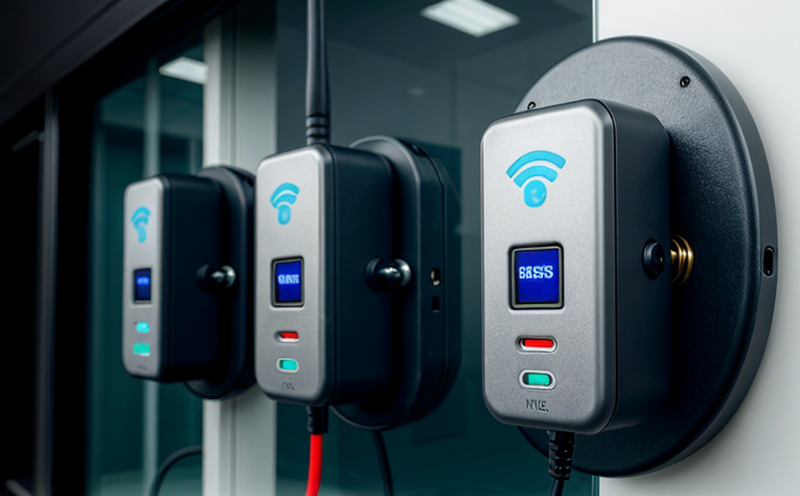FIPS 140-3 Cryptographic Module Testing for Wireless Communications
The FIPS 140-3 cryptographic module testing is a critical component of ensuring the security and integrity of wireless communication systems. This standard sets stringent requirements that must be met by all cryptographic modules used in securing sensitive information, particularly those employed in wireless networks.
The FIPS 140-3 protocol involves rigorous tests to evaluate the robustness of cryptographic algorithms and their implementation within a module. The testing process covers various aspects including key management, secure generation and storage, authentication mechanisms, and more. Compliance with this standard ensures that communication channels are protected against unauthorized access, ensuring data privacy and integrity.
Our laboratory offers comprehensive FIPS 140-3 cryptographic module testing services specifically tailored for wireless communications. Our team of experts uses cutting-edge equipment to conduct thorough assessments according to the latest standards. This includes simulating real-world attack scenarios designed to identify vulnerabilities early on in development cycles, thereby facilitating safer product launches.
One key aspect of our service is ensuring compliance with both FIPS 140-3 and other relevant international standards such as ISO/IEC 19772:2008. We employ state-of-the-art tools that can perform all necessary evaluations required by these regulations, providing clients peace of mind regarding their security offerings.
Another important consideration is the lifespan of cryptographic modules in wireless communication networks. As technology evolves rapidly, so too do threats faced by organizations relying on secure communications platforms. By adhering to FIPS 140-3 standards during initial design phases and periodic re-certifications throughout product lifecycles, we help ensure long-term security for our clients.
Our team also assists with the preparation of documentation needed for certification processes associated with FIPS 140-3 compliance. This includes creating detailed reports outlining test results and any areas requiring improvement based on the findings from each evaluation cycle.
| Test Area | Description |
|---|---|
| Key Management | Evaluating how keys are generated, stored, and managed within the module. |
| Algorithm Implementation | Ensuring correct implementation of cryptographic algorithms as specified by FIPS 140-3. |
| Physical Attacks | Testing resistance against various physical attack vectors. |
| Validation Against Standards | Confirming adherence to all applicable standards and guidelines. |
| Test Area | Description |
|---|---|
| Software Integrity Checks | Detecting any unauthorized modifications or vulnerabilities in software components. |
| Secure Boot Processes | Assessing methods used to securely load and verify the integrity of boot code. |
| Interoperability Testing | Evaluating compatibility between different cryptographic modules under varying conditions. |
| Data Encryption Protocols | Verifying effectiveness of encryption protocols in protecting transmitted data. |
We understand that staying ahead of emerging threats is crucial for maintaining robust security measures. That’s why our FIPS 140-3 testing services go beyond compliance; they provide valuable insights into potential weaknesses and suggest improvements to enhance overall system resilience.
By leveraging advanced technologies and methodologies, we offer reliable cryptographic module testing solutions that meet the stringent requirements set forth by FIPS 140-3. Our goal is not only to ensure regulatory compliance but also to contribute towards building more secure wireless communication networks for today’s digital landscape.
Benefits
- Ensure full FIPS 140-3 compliance, safeguarding sensitive information in wireless communications.
- Identify and rectify vulnerabilities early in the product development cycle to enhance security.
- Achieve peace of mind knowing your cryptographic modules are rigorously tested against industry-leading standards.
- Support long-term product lifecycle by regularly certifying compliance with FIPS 140-3.
- Gain valuable insights into potential weaknesses through detailed reports and recommendations for improvement.
Environmental and Sustainability Contributions
Eco-friendly practices are integral to our approach, and we strive to minimize the environmental impact of our operations. By ensuring secure wireless communication systems via FIPS 140-3 compliance testing, we contribute positively towards protecting sensitive data which reduces risks associated with potential leaks or breaches.
- Reduced risk of unauthorized access leading to reduced need for reactive security measures.
- Promotes responsible use of resources by focusing on prevention rather than remediation after incidents occur.
Use Cases and Application Examples
| Use Case | Description |
|---|---|
| Secure VoIP Communication | Testing cryptographic modules used in Voice over Internet Protocol (VoIP) systems. |
| Encryption for Wireless Networks | Evaluating the security of encryption algorithms employed in Wi-Fi networks. |
| Mobile Payment Systems | Ensuring secure processing and storage of payment information transmitted wirelessly. |
| Healthcare Data Transmission | Protecting sensitive medical records sent over wireless networks. |
| Use Case | Description |
|---|---|
| IoT Device Security | Evaluating cryptographic modules in Internet of Things devices for secure data exchange. |
| Government Communications | Testing security protocols used by government agencies to protect classified information. |
| Financial Services | Ensuring secure transactions and communications between financial institutions. |
| Telecommunications Infrastructure | Verifying the security of critical infrastructure components in telecommunications networks. |





